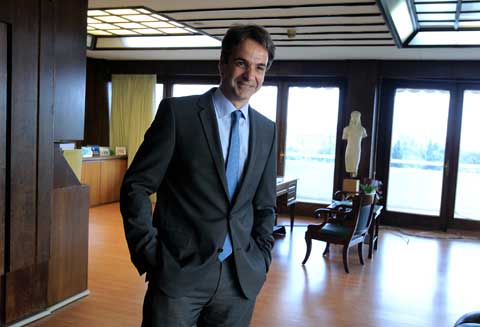Greece and Bulgaria signed several memoranda of cooperation and a joint declaration before the end of the 4th Greece-Bulgaria High Level Cooperation Council in Alexandroupolis on Wednesday, enhancing the two countries’ strategic partnership at all levels, said Prime Minister Kyriakos Mitsotakis in joint statements with his Bulgarian counterpart Boyko Borissov.
The neighboring countries decided to continue and enhance cooperation in defense, security, civil protection, economy, energy, transport, infrastructure, cross-border cooperation, culture, education and sports.
In particular, the collaborations include the Greece-Bulgaria cross-border rail traffic agreement, signed between Transport Minister Achilleas Karamanlis and his Bulgarian counterpart Rossen Jeliazkov. Karamanlis praised the agreement as one that will “create a framework that facilitates and accelerates bilateral cross-border cooperation.”
The Enterprise Greece-Invest Bulgaria Agency memorandum of understanding will provide for the exchange of information on investment opportunities in the two countries, market research and the provision of statistics.
The two countries also signed a Joint Declaration on the completion of 140 years of formal diplomatic relations, which Mitsotakis said shows that “Greece and Bulgaria have decided to move along the path of peace and development, in our countries, in the Balkans and throughout our wider region.”
A Joint Declaration on the promotion of cooperation in tourism was also adopted. Mitsotakis said Greece is the sixth largest investor in Bulgaria, while some 1.5 million Greeks traveled there in 2019 and Greece remains the top European tourist destination for Bulgarians.
Rail connections
In addition, the rail cross-border traffic agreement will also help achieve “our goal to connect the cities of Kavala, Alexandroupolis, Burgas and Varna by rail to the Danube,” Mitsotakis noted.
Two major road networks will be built to better interconnect the two countries, “especially the one that will connect Alexandroupolis with Dimitrovgrad,” and will contribute towards “a new commercial significance of all Greek ports in the Aegean, now connected with Ruse port on the Danube,” the Greek PM observed.
Mitsotakis and Borissov also agreed to look into the upgrading of the Nymfea-Makaza border crossing to allow trucks and buses through.
The two prime ministers reaffirmed their close coordination and mutual support at multilateral organizations, including the United Nations, and reiterated their support for the European accession of the western Balkans and their willingness to further cooperate in this direction.
On the recent tension in the Aegean Sea and Greece-Cyprus-Turkey relations, Mitsotakis said of Bulgaria that “our views also coincide on the importance of respecting international law, more so in the troubled region of the southeastern Mediterranean,” he added and that “our calm attitude towards aggressive challenges coming from the East should not be misinterpreted or underestimated.”
“The European Union and all member states must therefore send clearer and stricter messages to Ankara,” he elaborated.
Borissov
In his part, Borissov underlined the importance of the joint efforts to accelerate the pace of implementation of the projects on which the two countries cooperate.
He cited the IGB Gas Interconnector Greece-Bulgaria project, and how its construction, as well as the supply of the required pipes, was contracted by “a completely transparent tender” to two Greek companies. He asked Mitsotakis to go ahead with required actions that will see the completion of this project within the year.
Borissov made a special reference to the migration crisis and congratulated Mitsotakis on the measures taken by his government, thanks to which, he said, “Bulgaria has zero influx of migrants.”
Regarding relations with Turkey, Albania and North Macedonia, Borissov expressed the view that both Bulgaria and Greece have respected their commitments to Albania and North Macedonia, and emphasized that these countries should do the same for Greece and Bulgaria.





